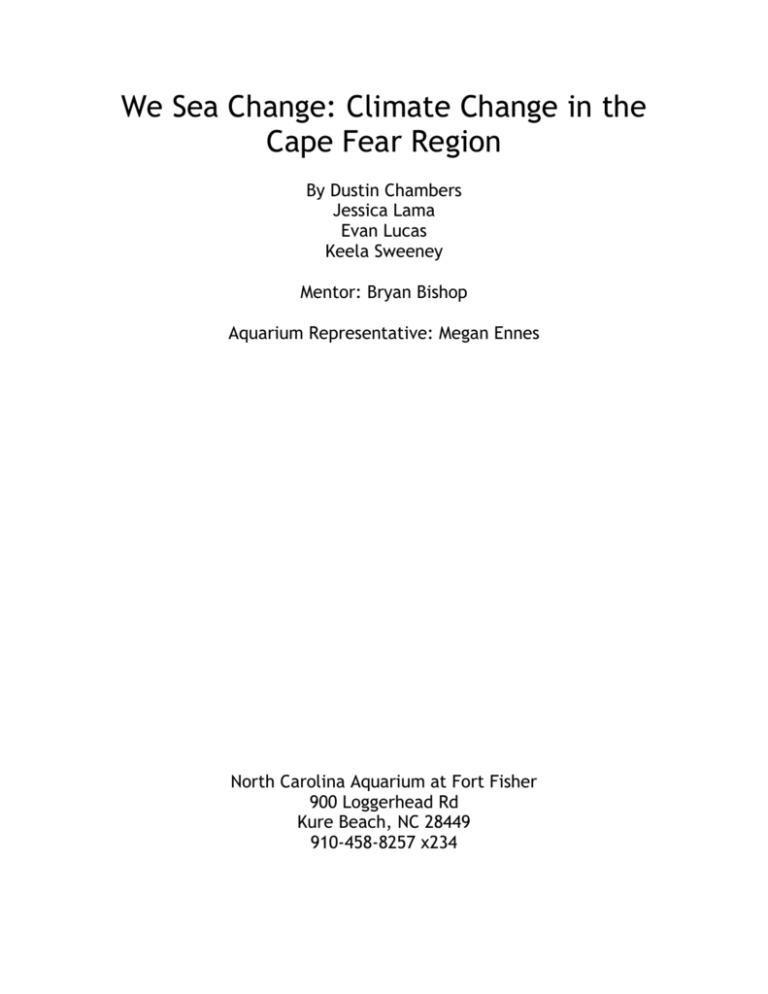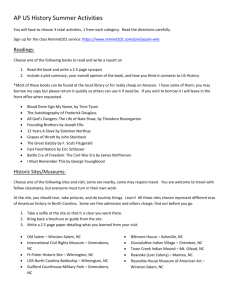Action Plan Revised
advertisement

We Sea Change: Climate Change in the Cape Fear Region By Dustin Chambers Jessica Lama Evan Lucas Keela Sweeney Mentor: Bryan Bishop Aquarium Representative: Megan Ennes North Carolina Aquarium at Fort Fisher 900 Loggerhead Rd Kure Beach, NC 28449 910-458-8257 x234 2 Table of Contents Problem Statement Issue Components Target Audience Specific Action Project Implementation Budget Milestones Partners Schedule Community Buy-in Works Cited Page Page Page Page Page Page Page Page Page Page Page 3 4 6 6 7 8 8 8 9 9 11 3 Problem Statement: The Cape Fear region on the coast of North Carolina will be impacted by changes in climate due to its location and topography. The Cape Fear region is one of the fastest growing regions in the country with Brunswick County listed as the 37th fastest growing county in the Nation (Brunswick County Economic Development Commission, 2007). Due to development, this area is at risk of flooding, shoreline erosion, and storm damages. According to the Environmental Protection Agency, sea levels on the East coast of the United States rose between .08-.12 inches a year in the twentieth century (Environmental Protection Agency, 2009). The Intergovernmental Panel on Climate Change predicts that if the rate of ice melt and temperature rise remains constant, the average global sea level will rise by 7.2 to 23.6 inches by 2100 (Environmental Protection Agency, 2009). As sea level rises, the beaches and barrier islands of the Cape Fear region will disappear. Sea level rise is not the only issue that will impact the Cape Fear Region. Increased storm activity and intensity will also negatively impact the North Carolina coast. The damage caused by storm activity will be exacerbated as sea levels continue to rise and barrier islands disappear. Wetlands and barrier islands serve as buffers from major storm events. As sea level rises and barrier islands migrate in towards shore, that buffer will disappear. Without the barrier islands to slow storms before they make landfall, the area will be impacted by stronger storms. As the climate continues to change, many other aspects of the Cape Fear region will be impacted including the economy and the environment. The Cape Fear 4 region relies on tourism as the basis of its economy. As storm activity increases and beaches begin to disappear, fewer tourists will want to visit the area. Climate change is a very large issue and has many smaller issues associated with it. Scientists believe that the best actions to decrease the impacts of climate change must be proactive and not reactive. Among other proactive actions, healthy ecosystems can help decrease the impacts associated with climate change. The EPA recommends protecting key ecosystem features by decreasing human stressors and restoring natural habitats (Baron, 2008, pp. 1-2). Education is also key to offset the issues of climate change. By educating the public on the causes of and the issues associated with climate change, we may be able to decrease the severity of climate change. It is important to start educating the public at a young age so that they do not develop the same habits that negatively impacted our climate. It is also vital to give the public alternatives to current lifestyles. The public wants to learn about solutions, not just the problem (Meyer, 2011). Issue Components: Due to changes in the climate, New Hanover County will see changes in the ocean. Rising sea level puts us directly at risk for flooding and beach loss. The following image shows areas of New Hanover County that are at risk of storm surge from hurricanes. Many of New Hanover County’s best neighborhoods, schools, and shopping areas are located within these areas. As sea level rises, these areas will be at risk of higher storm surges and flooding. 5 Figure 1: Hurricane Storm Surge Risk Area in New Hanover County (Hazard Analysis) New Hanover County is also at Risk of losing its beaches as sea levels rise. The following image shows beach front areas at risk of erosion. Figure 2: Erosion Risk Areas in New Hanover County (Hazard Analysis) The following image is a closer look at the erosion risk on Wrightsville Beach. It is evident that the projected beach erosion will affect several homes and roads within the Wrightsville Beach area. 6 Figure 3: Erosion Risk on Wrightsville Beach (Hazard Analysis) Since most of the beaches in New Hanover County are barrier islands they will be impacted by changes in sea level. Project Identification: Our target audience includes students learning about climate change and the general public audience at the North Carolina Aquarium at Fort Fisher. We hope to create a video that will educate the community about the effects of climate change through film while inspiring our regional neighbors to initiate climate-friendly actions towards the environment. The Eco Club at Isaac Bear Early College will help create a campaign to encourage our local students to take action against climate change. The specific action we hope to accomplish with this project is to educate others about the impacts humans have upon the natural cycle of climate change, and how it affects our coastal environment. We also hope to help educate the public on eco-friendly practices which will slow this process. We will host a premiere of our video and raise money to help restore a local marsh or estuary by selling tickets to 7 the premiere. Having healthy ecosystems is a great way to help offset the issues associated with climate change. We will also initiate a student movement to make a statement about climate change. Two ideas are “Rock Your Ride” where students pledge to carpool and ride the bus over a particular week or “The No Zone” where students pledge not to use plastic bags or plastic bottles. This will give us community buy-in as well as a measureable outcome. The film itself is our greatest action we want to accomplish. This movie will enable us to reach a much greater audience over a longer period of time. Even when we are no longer students in Wilmington, teachers can use this film as a tool to teach about climate change. To implement our project we will research experts in the field of climatology to teach us about the impacts we could see in Wilmington. We will next identify older residents to interview about changes they have seen in the Cape Fear Region. Along with interviewing the older generations, we will also interview local school children to learn how they believe they can offset climate change. These students will range from elementary school students to high school. Using the knowledge gained from interviews, we hope to be able to make our video as accurate as it can be. When the film is finished, we want to distribute it as economically and ecofriendly as possible. To achieve this, we will host the video on iTunes U. This also allows our local schools can use the video as a part of their curriculum. We will also meet with a local documentary company called Working Films to learn how to create a better film. 8 Once the video is completed, we will host a premiere party at the aquarium. We will show the video and have a panel of speakers for a discussion following the film. The speakers will include professors from the University of North Carolina Wilmington, the Army Corps of Engineers, and several others. The money raised through ticket sales will be donated to help restore a local marsh or estuary. While we are working on the video, our aquarium representative will be working on a curriculum to supplement the video. This is her portion of the project that she has to complete for school. The curriculum will be high school level activities that focus on climate. This will broaden the impact which our film will have upon the widespread community. It will also make it easier for teachers to educate their students about the growing problem of climate change. Our budget is $1000 that we received from the Mid-Atlantic Marine Educators Association. That money was used to purchase our video camera and memory cards. We also received $500 from Coastal America that we have used to fund our field trips. Our community members, such as Wilmington Water Tours, have been nice enough to give us discounted rates. Our major milestones in this project will be the fieldtrips we need to take to learn about climate change, finishing our 3 minute video along with traveling to DC, and our final movie premiere and student pledge. Our partners will include the North Carolina Aquarium at Fort Fisher who has been kind enough to arrange all of our fieldtrips and transportation. The Mid-Atlantic Marine Educators Association funded our camera. The University of North Carolina 9 Wilmington supplied most of our experts. Wilmington Water Tours took us up the Cape Fear River. Working Films met with us to help us make a better film. Not to be forgotten is Coastal America who made this whole project possible. Our schedule looks like this: Aug Approach Partners Fieldtrips Students Create Climate Change Script Students Record Information on Climate Change Identify and Conduct Interviews With Locals Interview Schools on Climate Change Solutions Finalize Film Student Summit Create Curriculum to Supplement Film Movie Premiere and Student Pledge Case Study Sept Oct Nov Dec Jan Feb Mar April 10 Our community buy-in will consist of students becoming involved in more climate friendly behavior. We will also see community buy-in from schools that use our video as a teaching tool. A local non-profit documentary company, Working Films, has already asked to host our film on their website. They want to have more of a local showing on their site. The aquarium will also use the video in their regular video rotation. Hopefully we can get a movement started to get people to use less plastic in our community, and therefore make a positive impact on the growing issue of climate change in our community. 11 Works Cited (2007). Retrieved August 28, 2010, from Brunswick County Economic Development Commission: Economic Development Commission Baron, J. e. (2008). Preliminary Review of Adaptation Options for Climate-Sensitive \ Ecosystems and Resources. U.S. Environmenal Protection Agency. Environmental Protection Agency. (2009, November 5). Sea Level Changes. Retrieved \ August 10, 2010, from Climate Change Science: http://www.epa.gov/climatechange/science/recentslc.html Hazard Analysis. (n.d.). Retrieved 1 30, 2011, from New Hanover County Vulerability Assessment: http://www.csc.noaa.gov/products/nchaz/htm/case2.htm Meyer, D. (2011, January 12). Ocean Project Market Research .





